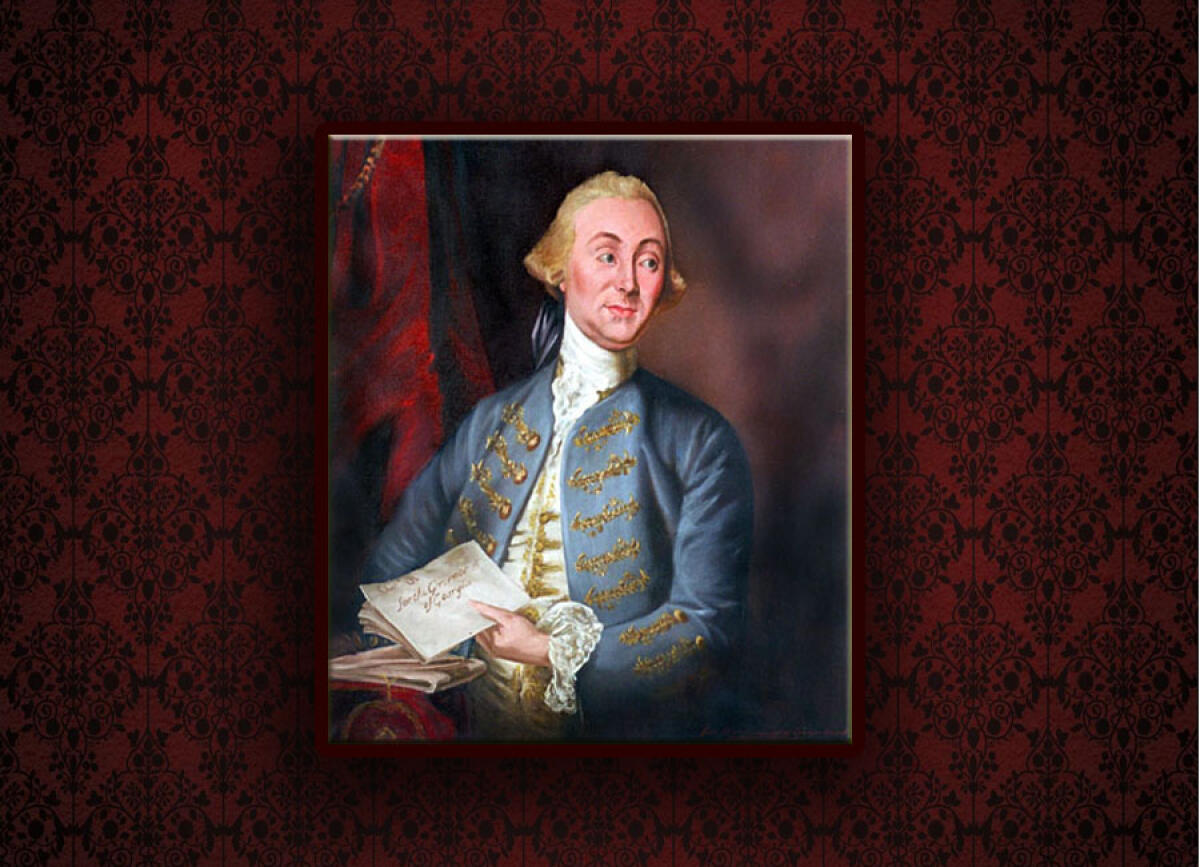- Wednesday, 11 February 2026
- Have a HOT TIP? Call 704-276-6587 or E-mail us At LH@LincolnHerald.com
Georgia – The Outlier
Another article from the SAR and DAR leading up to America's 250th birthday in 2026.

Portrait by Andrea Soldi (Public Domain Photo)
The colonies elected delegates to the First Continental Congress in various ways. Some delegates were elected through their respective colonial legislatures or committees of correspondence. Georgia was the only colony that did not send any delegates to the First Continental Congress. Facing a war with neighboring Native American tribes, the colony did not want to jeopardize British assistance.
The original intent for the First Continental Congress was to organize a boycott to oppose British tyranny and to come up with a plan to proceed. The colony had prospered under royal rule so many opposed British trade regulations and hesitated to join the revolutionary movement that emerged in the American colonies.
Until 1763, Georgia was the youngest and weakest of the British southern colonies. But the Treaty of Paris which ended the Seven Years’ War, removed the Spanish from their southern border. The two new British provinces of East and West Florida were new friends who had added considerably to Georgia military security and peace of mind. The Spanish interference with the Creek Indians (Georgia’s most belligerent neighbors) had ended. Besides getting rid of her unpopular Spanish neighbors, Georgia had more than doubled her land available for while settlement.
A congress attended by British Indian Superintendent John Stuart, the southern governors and the southern Native American tribes was held in Augusta in November 1763 which informed the Native Americans of the Spanish exit and the French remove from the land east of the Mississippi River forming a new basis for trade between the Native American tribes and the white settlers. The meeting led to a peace treaty and a land cession including lands between the Savannah and Ogeechee Rivers to just above Ebenezer to Little River and another strip of land about 30 miles deep between the Altamaha and St. Mary’s Rivers. The land between the Savannah and Ogeechee was soon settled by immigrants from the older colonies to the north and the Scotch-Irish direct from Northern Ireland.
There was a spirit of optimism and hopefulness for the future came from more than getting rid of her Spanish neighbors and the Native American land cession. These changes were as much an indication of the colony’s new attitude as they were a result. Both changes resulted from international political moves that Georgia could not have possibly brought about by her own efforts. Georgia had ceased being the favorite charity of Englishmen and had become an ordinary colony. She had slaves, liquor, lawyers, plantations, a governor and a legislature. Though not getting as much help from the British army as desired, Parliament was providing some financial help. Economically and politically smaller and weaker than South Carolina to the north, but time would allow for Georgia’s maturity and growth as the frontier province.
One thing that also made Georgia different that several other colonies was the ability of who would be their last royal governor, James Wright. He was an accomplished attorney who understood the political and economic conditions through his legal training in South Carolina which included working as South Carolina’s agent in London. He used his skill and ability to get what he wanted out of the assembly and the colony. He had a considerable personal interest in Georgia’s economic development as one of the largest planters in Georgia. He did not believe in land speculation and actively farmed the lands he acquired. Wright’s relationship with his assemblies was harmonious throughout most of his period as governor. Of course, there were differences and protracted arguments between the governor and the assembly, and there was certainly an opposition party after 1765. But for ordinary legislative matters, Wright and the assembly got along quite well.
Strictly speaking, throughout the colonial period Georgia had but one government, that in Savannah. Parishes did exist (twelve after1765) as subdivisions for religious organizations, militia, voting, and local justice; but they were administrative subdivisions rather than units of local governments. Virtually the only elected parish officials were the vestrymen and church wardens. Justices of the peace, constables, parish tax collectors, and other local officials were appointed from Savannah. There was little real need for government outside Savannah until the 1773 Indian cession was settled.
Indian relations were important to most of the American colonies, but to a frontier colony like Georgia they were of the utmost importance. The treaty and land cession of 1763 did not bring immediate peace to the southern back country. The Native American tribes did not fully understand the change which had been made, and French agents continued to operate east of the Mississippi regardless of the fact that this was now British territory. The Creeks, the strongest Native American group in the South, were the last to accept the results of the peace, the 1763 cession, and British friendship. They delayed the surveying of the boundary line agreed upon in 1763, so that it was not finished until December of 1768.By 1765, the Creeks were generally peaceful, and Governor Wright reported that there were no whites killed by Creeks in 1766. This was a most unusual record!
Peace with the Creeks continued until 1768, but after that it deteriorated. By 1771 and 1772 the situation had become serious again. An urgent appeal for British troops was made but was refused as had been other recent requests for frontier protection. The British commander-in-chief in America promised to send troops if hostilities actually broke out, but not before. This might be too late. A special session of the assembly met in the summer of 1774; and, at Wright’s and Stuart’s insistence, the British government issued instructions to all the Southern colonies to stop the Creek trade, instructions that could never be carried out completely. In the fall a Creek conference was called at Savannah at which both sides promised to live up to their former agreements and to respect the boundary line separating them.
By the time of the First Continental Congress, the situation with the Creeks was intense and British military support was badly needed. The intent of the meeting was a boycott which was a less importance to Georgia. Though there was no manufacturing in colonial Georgia, people devoted themselves almost entirely to farming operations and imported their manufactured goods. A little cheap homespun cloth, a few cotton stockings, some plantation shoes, blacksmith products, and a little furniture made up Georgia manufactures. Despite the abundance of good timbers for shipbuilding, few ships were built.
Though Georgia had some direct trade with Britain, the great majority of her European trade went through Charleston because of better shipping connections, insurance rates, and naval convoy routes. Coasting vessels plying between the mainland colonies and the West Indies stopped at Savannah and were responsible for much trade and contact with the outside world. Trade was conducted with Charleston, the West Indies, New England, England, and the middle colonies. They saw no need to send delegates to Philadelphia. But things changed…or did they?
Georgia delegates gathered in a provincial congress in Savannah on January 18, 1775, to discuss whether to join the Association, and to elect representatives to the Second Continental Congress. Those who were elected declined to go to Philadelphia, however, because the delegates were divided on the action to be taken. St. John’s Parish, acting alone, sent Lyman Hall to the Second Continental Congress.

 Jennifer Baker, DAR Vesuvius Furnace
Jennifer Baker, DAR Vesuvius Furnace














